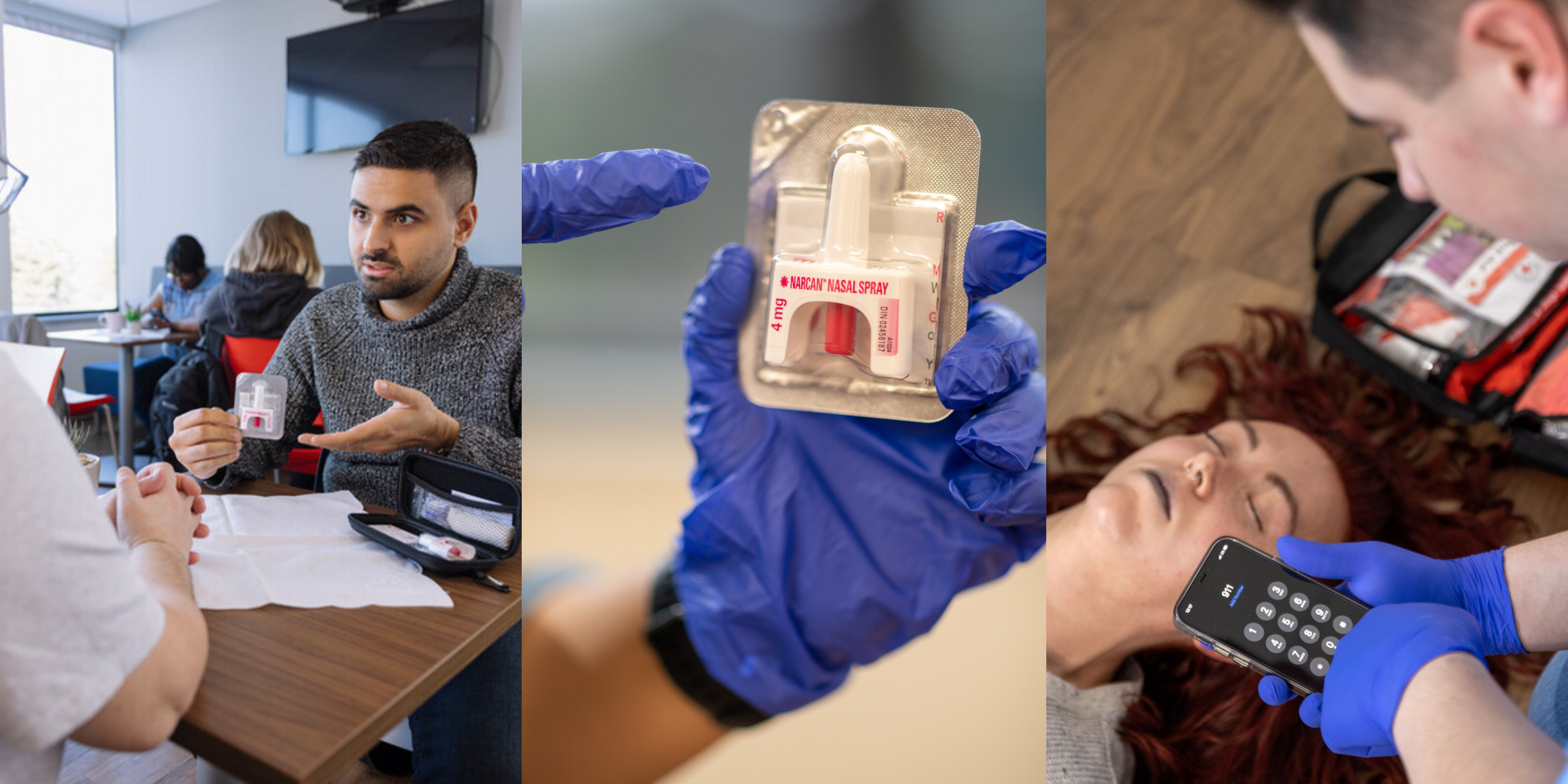First Aid for Opioid Poisoning
► Price: $30.00
► Online
In the First Aid for Opioid Poisoning online course, you will become knowledgeable and confident in how to respond to an opioid poisoning emergency, including how to administer intranasal and intramuscular naloxone.
What will you learn?
- You will learn to recognize the signs and symptoms of opioid poisoning.
- What naloxone is and how naloxone works to reverse an opioid poisoning.
- Understand how opioids and naloxone affect the body.
- Explore ways to reduce the influence of stigma around opioid poisoning.
- Learn how to respond confidently to an opioid poisoning emergency.
- How to administer intranasal and intramuscular naloxone.
Who should take the First Aid for Opioid Poisoning course?
Anyone 16 years of age and older. This course has no prerequisites.
Canadian Red Cross Online-Based Learning
- Self-directed: Learn at your own pace by working through the training materials online.
- Duration: Approximately 1 hour online.
- Knowledge check on each module: You will need to pass the test at the end of each module with a score of at least 70%. You will be able to review the module content and try as many times as necessary to complete the course.
Advance your career with a certification
- Successfully completing the course will earn you a Red Cross certificate of completion of First Aid for Opioid Poisoning.
Module Overview for First Aid for Opioid Poisoning Emergencies
Module 1: The Opioid Crisis in Canada
The purpose of this lesson is to explore the growing opioid crisis in Canada. The increase in the use of both prescription opioids and illegal drugs, the changing nature of the drug supply, and the ongoing effects of the COVID-19 pandemic have led to an alarming increase in deaths and hospitalizations from opioid poisonings.
In this module, you will learn some reasons for the worsening crisis, how pandemic-related protocols may have reduced access to harm reduction resources and how decreased social connection can contribute to bystander reluctance, especially with strangers.
Module 2: Reducing Stigma
This lesson aims to examine how stigma affects opioid harm reduction activities, often 'othering' people who use drugs. By reducing stigma, we can remove barriers that prevent people from accessing help, leading to faster response rates and better health outcomes.
In this module you learn how opioid poisoning emergencies can impact all Canadians and how using person-first language reduces stereotypes and promotes respect and dignity.
Module 3: Learn More About Opioid Poisoning Emergencies
In this lesson, you will be introduced to the concept of an opioid poisoning emergency. It will provide some basic background information that will help you understand the characteristics of opioids and how they can affect the body.
You will learn how opioids affect the body, why we use the word “poisoning” instead of “overdose,” and strategies to prevent an opioid poisoning emergency.
Module 4: Learn How to Access and Administer Naloxone
This lesson will introduce you to naloxone and explore the effects of this life-saving medication. You will learn how naloxone temporarily reverses the effects of opioids within the body, how to access naloxone, and how to prepare and administer intranasal and intramuscular naloxone.
Module 5: Introduction to CPR
In this module, you will learn how to care for a person with opioid poisoning, including an introduction to cardiopulmonary resuscitation (CPR). Whenever a person is unresponsive and not breathing, you will need to do CPR.
Module 6: Qualities of a Helper
Everyone can help in an emergency, no matter their skills, training, or abilities. A person who is experiencing opioid poisoning needs help, and there are lots of different ways to help them.
In this module, you will identify how to use the qualities and skills you have to help in an emergency.
Module 7: How to Help in an Opioid Poisoning Emergency
Learn how to recognize and provide care for a suspected opioid poisoning emergency. Here you will learn how to apply your CPR and naloxone administration skills. You will be introduced to “Check, Call, Care” and how to monitor the person and the scene while waiting for emergency medical services to arrive.
Module 8: Introduction to Self-Care
Being involved in an emergency or personally impacted by the opioid crisis can affect our well-being. Taking the time to learn about the types of stress and how we can better take care of ourselves is a life journey. In this module you will learn the importance of checking in on your physical, emotional and mental health after a stressful situation. You will learn how to use the Look, Listen, Link, Live model to maintain your resilience daily and after an emergency.
OHR Project content was developed with and approved by the CRC Opioid Harm Reduction Advisory Council. This expertise will be integrated into the CRC Health Education Council. To learn more about the Project or the Council, visit www.redcross.ca/OHRadvisory.
How to register:
1. Have your payment method ready before you begin.
2. Complete your registration and payment within 10 minutes.
3. Do not refresh your browser or submit your payment more than once.
REGISTER FOR THIS COURSE

